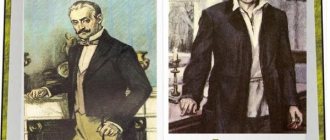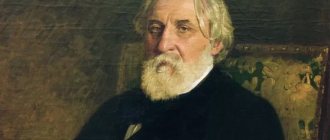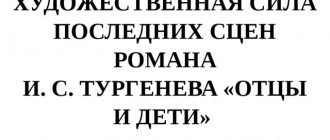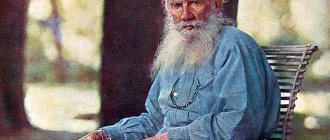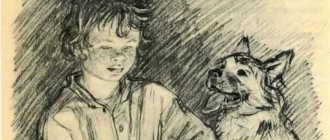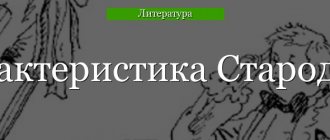Origin and upbringing
Pavel Petrovich Kirsanov is the elder brother of Nikolai Petrovich Kirsanov, uncle of Arkady.
The Kirsanov brothers were brought up in the family of a military general in 1812. He was not a very literate, rather rude man who devoted his entire life to military affairs. However, he was not evil, he took care of his sons and gave them a good education.
The mother was a typical general's wife, a commander not only in the family, but also in society, mainly provincial, where her husband first commanded a brigade, then a division and, by virtue of his rank, played a significant role. She, as the wife of a general, took advantage of her position.
Pavel Petrovich followed in his father's footsteps and became a military man - he graduated from the Corps of Pages, a privileged military educational institution for young nobles, and then entered service in the guard.
In the secular society of St. Petersburg, he quickly became one of his own, leading the same life as other young people of that time (A. Pushkin showed this in detail using the example of the life of Eugene Onegin). He was a great success with women.
His career developed successfully, but everything was changed by the fatal love that befell the young man.
Fatal love
Once having met Princess R. at a ball and falling madly in love with her, 27-year-old officer Pavel Petrovich left a brilliant military career for the sake of this woman.
Her name is Nellie. She is married, but has no children.
The princess's character and behavior are unpredictable. In society she seems cheerful and frivolous, dances and jokes, but at night she cries, prays, finds no peace, rushes around the room or sits pale over the Psalter. She either laughs for no reason, or cries...
In communicating with her, Pavel Petrovich always had some kind of understatement, heaviness; he could not solve the riddle of this woman and therefore, loving her passionately, he constantly suffered, her mystery beckoned and tormented him.
When she went abroad, he followed her, abandoning both his service and his career. But the princess had already lost interest in him, and this made his suffering even stronger. Finally, there was a complete break in their relationship, and Kirsanov returned to St. Petersburg. But during the 10 years of absence, he lost all his former connections, lost the skill of social life - he could no longer get back into the old rut. He started avoiding people. His life lost its meaning. And then he went to his estate Maryino.
What was it?
Most likely, this is how feelings manifest themselves in monogamous people. They love once and for life. This is a property of a person that does not depend on himself and is not subject to condemnation.
As for Princess R., there is some kind of mental deviation here - these tossing, sudden transitions from laughter to tears, etc. The author writes that “she died in Paris, in a state close to insanity.” That’s the whole mystery of this woman, which poor Pavel Petrovich was so eager to solve.
Appearance
At the beginning of the novel, Pavel Petrovich Kirsanov is about 45 years old. He is of average height, handsome and good-looking even at this age - this is natural, he has been distinguished by his beauty since childhood.
He already has gray hair, cut short, but he looks youthful, there are no wrinkles on his face. He always carefully monitors his appearance: his teeth were strikingly white, his hands had long pink nails. His appearance was distinguished by grace and thoroughbredness, preserved by youthful harmony.
He is meticulous in his clothes, dressed in the fashion of his time, expensively, tastefully, and even in the village he did not betray his rules or, as he said, “principles.” In a dispute with Bazarov, Pavel Petrovich explained his position this way: “I live in a village, in the wilderness, but I don’t give up on myself, I respect the person in me...”. It is impossible to disagree with this, and it is impossible to put this principle among the negative qualities of a person. A.S. Pushkin also convinced that “you can be a efficient person and think about the beauty of your nails.” And much later, A.P. Chekhov expanded this formulation, saying: “Everything in a person should be beautiful: face, clothes, soul, and thoughts.” Pavel Petrovich Kirsanov fit this formula perfectly. He took care not only of his appearance, but also of his behavior, never allowing himself a cheeky tone when talking with people, and was courteous and attentive.
The main topics of the dispute between E.V. Bazarov and P.P. Kirsanov (based on the novel by I.S. Turgenev “Fathers and Sons”)
Three main disputes between Bazarov and P.P. Kirsanov, in which these issues are raised.
1) the theme of the nobility , its role in life. According to Kirsanov, aristocrats are the driving force of social development. Their ideal is “English freedom” (constitutional monarchy), the path to the ideal is liberal (reforms, openness, progress). According to E. Bazarov, aristocrats are not capable of action, there is no benefit from them, Bazarov rejects liberalism, denies the ability of the nobility to lead Russia to the future.
2) nihilism and the role of nihilists in life . Pavel Petrovich condemns nihilists for the fact that they “respect no one,” live without principles, consider them unnecessary and powerless: “You are only four and a half people.” To this Bazarov replies: “Moscow burned down from a penny candle.” By denying “everything,” Bazarov means religion, the autocratic-serf system, and generally accepted morality. What do the nihilists claim? First of all, the need for revolutionary action. Their criterion is public benefit.
3) the view of both sides on the people . Pavel Petrovich glorifies the peasant community, family, religiosity, and patriarchy of the Russian peasant. Bazarov says that the people do not understand their own interests, are dark and ignorant, but considers it necessary to distinguish people’s interests from popular prejudices, claims that the people are revolutionary in spirit, therefore nihilism is a manifestation of the people’s spirit.
4) the attitude of the disputants towards art and nature . Pavel Petrovich blesses and glorifies art. The author agrees with P. Kirsanov on this. Bazarov denies art (“Raphael is not worth a penny”) and approaches nature purely materialistically: (“Nature is not a temple, but a workshop, and man is a worker in it.”)
Evgeny Bazarov and Anna Sergeevna Odintsova. Test of love in the novel by I.S. Turgenev "Fathers and Sons".
I. S. Turgenev in his works subjected heroes to two tests: the test of love and the test of death. Why did he choose these particular tests?
love is the purest, highest and most beautiful feeling; the soul and personality of a person are revealed to it, showing their true qualities, and death is a great equalizer; one must be prepared for it as something inevitable and be able to die with dignity.
At the beginning of the novel, the author presents his hero as a nihilist, a person “who does not bow to any authorities, who does not take a single principle on faith,” for whom romanticism is nonsense and whim: “Bazarov recognizes only what can be felt with his hands , to see with the eyes, to put on the tongue, in a word, only what can be witnessed by one of the five senses.” Therefore, he considers mental suffering unworthy of a real man, high aspirations - far-fetched and absurd. Thus, “...disgust for everything detached from life and evaporating in sounds is the fundamental property” of Bazarov. And this man, who denies everything and everyone, falls in love with Anna Sergeevna Odintsova, a rich widow, an intelligent and mysterious woman. The main character drives away this romantic feeling, hiding behind crude cynicism. In a conversation with Arkady, he asks about Odintsova: “What kind of figure is this? She’s not like other women.” From the statement it is clear that she interested Bazarov, but he is trying in every possible way to discredit her in his eyes, comparing her with Kukshina, a vulgar person.
On his second visit to Odintsova’s estate, Bazarov is very worried, but tries to restrain himself. He increasingly understands that he has some kind of feeling for Anna Sergeevna, but this does not agree with his beliefs, because love for him is “nonsense, unforgivable nonsense,” a disease. Doubts and anger rage in Bazarov’s soul, his feelings for Odintsova torment and infuriate him, but still he dreams of reciprocal love. The hero indignantly recognizes the romance in himself. Anna Sergeevna tries to get him to talk about feelings, and he speaks about everything romantic with even greater contempt and indifference.
Before leaving, Odintsova invites Bazarov to her room, says that she has no purpose or meaning in life, and cunningly extracts a confession from him. The main character says that he loves her “stupidly, madly,” and from his appearance it is clear that he is ready to do anything for her and is not afraid of anything. But for Odintsova this is just a game, she likes Bazarov, but she does not love him. The main character in a hurry leaves Odintsova's estate and goes to his parents. There, while helping his father with medical research, Bazarov becomes infected with a serious illness. Realizing that he will soon die, he casts aside all doubts and beliefs and sends for Odintsova. Before his death, Bazarov forgives Anna Sergeevna and asks to take care of his parents.
In the novel “Fathers and Sons,” the main character passes the test of love, unlike the heroes of other works by I. S. Turgenev. Bazarov sacrifices everything for the sake of love: his beliefs and views - he is ready for this feeling and is not afraid of responsibility. But here nothing depends on him: he completely surrenders to the feeling that engulfs him, but receives nothing in return - Odintsova is not ready for love, so she pushes Bazarov away.
In the novel “Fathers and Sons,” I. S. Turgenev finds the hero he has been looking for for so long, a hero who has stood the test of love and death.
 General characteristics of poetry of the 2nd half of the 19th century (N.A. Nekrasov, A.A. Fet, F.I. Tyutchev). Civil lyrics and “pure art”. Reading by heart a poem by one of the poets.
General characteristics of poetry of the 2nd half of the 19th century (N.A. Nekrasov, A.A. Fet, F.I. Tyutchev). Civil lyrics and “pure art”. Reading by heart a poem by one of the poets.
It must be said that by the mid-50s, after the clear dominance of prose, lyric poetry began to flourish. Writers of the 19th century - N. A. Nekrasov, A. A. Fet, F. I. Tyutchev.
More details about each of them:
Features of Nekrasov's lyrics:
1) Nekrasov spoke the language of the common people (special vocabulary, stylized as folklore; special syntactic turns; intentional errors in pronunciation and spelling of words);
2) The poet writes for the upper strata of society, so that they know better about the life of the common people;
3) Sonority, melodiousness of poetry;
4) A clear plot, the presence of (usually) several characters, a rhyming story;
5) Nekrasov brought poetry closer to prose.
The main themes of Nekrasov’s work:
— Theme of the poet and poetry (“The Poet and the Citizen”, “Elegy”, “Yesterday at six o’clock...”);
- The theme of the suffering of the Russian people (Nekrasov showed interest in the fate of peasant children, in the Russian peasant woman). These include the poems “On the Road”, “Troika”.
— Nature theme (“Uncompressed strip”).
F. I. Tyutchev - main topics and features:
- The theme of nature (he believed that the universe is a living spiritual being that develops and grows, rushes towards the triumph of truth and goodness. With it, the barrier between nature and man disappears. Tyutchev feels regret and bitterness towards people to whom nature is alien and incomprehensible). Poems: “Spring Storm”, “Noon”, “Spring Waters”.
— Theme of love (Tyutchev believed that love takes a person out of the stuffiness of loneliness. Gives a breath of fresh air. Love cannot satisfy all a person’s needs. As a result, it leads a person to death. There is no beauty and harmony in love. It is a destructive element.) Poems: “She was sitting on the floor”, “Oh, how murderously we love”, “Last love”, “I still languish with the longing of desires.”
- Philosophical theme (the world of nature and man in Tyutchev’s perception is not complete, it is in a state of painful creative development. This development in Tyutchev’s philosophical lyrics takes place in the struggle of two universal states of being - chaotic with cosmic. Chaos embodies the elements of rebellion and destruction, space - the elements reconciliation and harmony. In chaos, demonic energies predominate, in space - divine energies). Poems: “Day and Night”, “Silentium” (“Silence”).
The main themes and features of A. A. Fet’s lyrics:
— Poems about the purpose of poetry (theme of the poet and poetry) (Fet believes that a true poet must free the reader from everyday problems, change his life, give the reader another world full of emotions and impressions): “With one push, drive away a living boat”;
— Theme of love (pays attention to the origin, the beginning of feelings. A joyful state from the first falling in love. Love is a deep, elemental feeling that brings joy and pain. Another feature is the absence of an idealized image of the heroine): “I came to you with greetings,” “ Whisper, timid breathing";
— Theme of nature (shows interest in the transitional states of nature. Nature is fused with the emotional experiences of man): “Evening”, “This morning, this joy.”
You can also compare Tyutchev with Fet (to be sure):
Their similarities are that they are contemporaries. That both poets are characterized by a deep analysis of human emotional experiences. That they are both representatives of “pure art”.
Differences:
— Fet in his poems describes a minute moment. His poetic space is filled with color and smells. Tyutchev’s scale is cosmic. He rarely draws from life. He has a craving for chaos.
— In poems about nature, Fet pays attention to the transitional states of nature. Nature is the natural environment for man, in his opinion. Tyutchev's poems about nature contain creative thoughts about fate (poet-philosopher). He strives to understand nature, to include it in his system of beliefs.
Character
Pavel Petrovich, possessing stable life principles, did not put pressure on anyone and did not call on anyone to follow his principles. He lived on the Maryino estate, which he owned together with his brother, got along well with all the family members and did not blame his brother for the fact that he, a nobleman, fell in love with a simple girl and that they had a child. He had tender feelings for Fenechka, partly because she looked like his beloved, Princess R. He loved to tinker with their son Mitya. Helped my brother financially. There were never any quarrels or mutual reproaches between them, which so often happens between relatives, especially when it comes to financial issues.
On top of everything else, Pavel Petrovich was a practical man, which even his brother agreed with, although it was Nikolai Petrovich who mainly managed the estate.
Due to differences in views between Pavel Petrovich and Bazarov, an acute conflict arose, which ended in a duel. The formal reason for the duel was that Pavel Petrovich saw Bazarov secretly kissing Fenechka.
No one died in the duel, and Pavel Petrovich escaped with a slight injury.
What kind of disagreements were there between Kirsanov and Bazarov?
Ideological differences
Pavel Petrovich considered himself a Slavophile (Slavophiles believed that Russia had its own, special path of development, not similar to Western Europe), but adhered to liberal views.
The liberal Kirsanov and the nihilist Bazarov constantly argued about current issues of the time: attitudes towards the social system, the nobility, the people, religion, art.
Pavel Petrovich recognized that society is imperfect, there are many shortcomings in its structure. Bazarov was of the same opinion, but believed that Kirsanov was only denouncing, and this was not enough, society must be corrected. The main goal of nihilists is activity. But what kind of activities does Bazarov offer? Destroy the old world, and someone else should do the building of a new world: “First you need to clear the place.”
Dispute about the Russian people. Kirsanov is touched by the religiosity and patriarchy of the people. Bazarov despises the peasant for the same thing. There are serious differences between them in their attitude towards art and nature. Pavel Petrovich talks about spiritual life and the need for culture. Bazarov ridicules everything that has no practical meaning (“reading Pushkin is wasted time, playing music is stupid, enjoying nature is absurd”), art only distracts a person from business.
How did this duel of opinions end?
Nothing. There is no winner in it. Everyone remains to their own opinion. In the finale, Turgenev shows the lifelessness of the ideas of both heroes: Kirsanov goes abroad and lives in Dresden, without renouncing his principles, but realizing that a change of eras, worldviews and generations is taking place in Russia. Bazarov goes to his parents and gradually comes to realize the inconsistency of nihilistic principles. The younger generation, infected with the ideas of nihilism, is not capable of changing Russia for the better, because... Before you destroy, you need to know for sure what to build next. The experience of predecessors cannot be ignored.
Character history
Ivan Sergeevich Turgenev wrote the novel “Fathers and Sons” in 1860. For that time, the work turned out to be advanced and symbolic. Kirsanov Jr. and Bazarov, the heroes of the novel, became idols of youth. Kirsanov Sr. is presented as a man whose beliefs have lost their former relevance. “Fathers and Sons” describes a turning point when social views change, attitudes towards the people, attitudes towards science and other categories are revised. Traditional judgments are replaced by progressive ones, and a generational dispute arises.
Ivan Turgenev
The established social class is represented in the form of fathers. The old generation is personified by Pavel Kirsanov, who receives reproaches and condemnation from young people who talk about nihilism. He is opposed to the revolutionary Bazarov. Antagonists clash in verbal battles, defending their point of view. The ending of the novel reveals to the reader the degree of correctness of each of the characters.
Conclusion
Each new era gives new people, and with them new beliefs, views, ideas. But the change of generations should not take place in a revolutionary way: destroy everything old and build a new world on the ruins of the old. It doesn't happen that way. Or rather, this is what happened in Russia in 1917. But this is the wrong way. The new generation must take all the best from previous generations and develop further, only then is it possible to move forward. The image of Pavel Petrovich Kirsanov brings balance to the ideological dispute between two opponents: you cannot look for truth in extremes, it is always in the middle.
What idea would have further possessed Bazarov if not for death?
Perhaps that is why Turgenev did not share Bazarov’s nihilistic beliefs and debunked them, because he foresaw what this could lead to. The new generation has not yet really developed new views: nihilism is a transitional state of the hero’s worldview, and he is gradually moving away from it.
Characteristics of the image of Pavel Petrovich Kirsanov can be useful when writing essays and for preparing literature lessons.
History of creation
Turgenev began creating the novel “Fathers and Sons” in 1860. While traveling around England, the writer decided to capture Russian reality. He began work on the work while living on the Isle of Wight. According to the original plan, the central character of the novel was to be a young doctor.
Early and modern editions of the novel "Fathers and Sons"
The prototype of Bazarov, the main character, is the doctor the writer met on the train. In a conversation with his interlocutor, Turgenev heard echoes of nihilistic reasoning. This trend was gaining popularity at that time, and the hot arguments of the young man impressed the author.
The first part of the novel was completed in 1860. Arriving in Paris, Turgenev thought a lot about the idea of the book. The characterization of Bazarov was important to him, since Ivan Sergeevich supported the beliefs of the protagonist. After some time, the writer felt the need to return to Russia, where he finished the novel.
Ivan Turgenev with colleagues from Sovremennik
The writer was able to see firsthand how the emerging social movements worked in his homeland (at that time serfdom was abolished - a global step for the country and the people). Turgenev wrote the last chapters of the novel in the village of Spasskoye.
“Fathers and Sons” was first published in the Russian Messenger magazine. The image of Bazarov, as the writer predicted, caused numerous discussions and disputes. Responses in print media were not long in coming. The life history, origin, quotes of the young nihilist were examined in critical articles.
Vissarion Belinsky
After the first publication, Turgenev corrected the text of the work, changing the description of the main character, making the character softer. In 1862, the novel was published with a dedication to Turgenev’s close friend, Belinsky. The uniqueness of the book lies in its reflection of the age-old dispute between generations using the example of a specific family, as well as in the comparison of socio-political views of representatives of different ages and classes.
